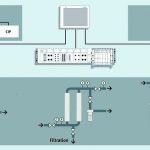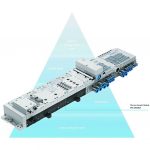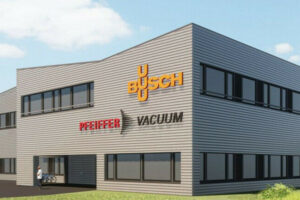Fluctuating water consumption and increasingly polluted raw water – these are the market demands to which more and more manufacturers in the process industries need to adjust. The answer is plants based on the Lego principle. Users can add modules or switch them off in line with requirements. Yet this can only be achieved with modular automation. The CPX automation platform from Festo is the central element in this concept – reflecting the motto “numbering up instead of scaling up”.
Modular automation for multi-stage and flexible water treatment
Plants based on theLego principle
Fluctuating water consumption and increasingly polluted raw water – these are the market demands to which more and more manufacturers in the process industries need to adjust. The answer is plants based on the Lego principle. Users can add modules or switch them off in line with requirements. Yet this can only be achieved with modular automation. The CPX automation platform from Festo is the central element in this concept – reflecting the motto “numbering up instead of scaling up”.
Flexible and modular production plants require autonomous, intelligent units. This is where the processing and manufacturing worlds meet – in their approach to Industry 4.0, the fourth industrial revolution. Digitisation and networking enable automated modules at field level to be connected simply and reliably with a master control system while also providing communication between them – in just the same way as Lego bricks click together to form a solid but nonetheless flexible structure.
Industry 4.0 as the solution
Flexible production processes, as described in the Industry 4.0 model, are needed to maintain the competitiveness of process industries in ever more volatile markets. The prerequisite for this is adaptive, self-configuring and self-organising flexible water treatment plants with a high level of networking. Process-related and functional modularisation of plant sections is a sensible step for batch processes and systems with various filtration technologies.
Beverage production is a good example here. Raw water contamination can vary considerably depending on where the factory is located. That is why several treatment steps are necessary to obtain high-quality water. This can be achieved with a mix of various subsystems such as gravel filters, ion exchangers, ultrafiltration or reverse osmosis and a pumping station.
The sales volume of the end product also fluctuates heavily in the consumer goods market, as does the consumption of product and process water. Flexible water treatment based on modular automation is therefore all the more vital.
Modular and intelligent
Each module should incorporate all the automation functions it requires to carry out its own process. Automation functions could also be provided by a central control system. However, a master control system is not designed for modular plants, in which easy replacement of individual modules is a key requirement. Process-related modules, on the other hand, need a small, adaptable and autonomous automation system. By implementing decentralised, intelligent solutions in the individual modules there is no need to re-program and re-configure the application software. The modules can be integrated into the overall automation solution for the production process with only minimal effort. This allows several automated modules to be added to the plant without having to extend the overall automation technology. “It’s important to be able to expand or modify plants easily without having to immediately resort to a large-scale facility. In other words, numbering up is the aim rather than scaling up”, explains Dr. Eckhard Roos, Head of Key Account and Industry Segment Management Process Automation at Festo.
CPX automation platform
The Festo CPX automation platform has once again proved to be ideal as the central element of a modular automation system. This platform accepts not only pneumatic components in its IP65 / 67 variants but also different controllers and remote IOs for a number of sensors, for example for pressure monitoring or temperature measurement, on a modular basis.
In the water treatment field, for example, skids can be created in multiple configurations, depending on the application. These fully transportable filter systems are especially interesting in cases where the demand for water is low, requiring treatment of up to 1000 m³ of water per day. Transportable filter systems enable water production to be started up very quickly.
Skid variants
Whereas, say, pump skids, with their low level of complexity, require only a few valve slices in the pneumatic section of a CPX / MPA, filter module skids need analogue inputs and outputs for pressure monitoring. More complex modules such as a CIP skid, which comprises plant sections and containers for cleaning agents and for mixing cleaning solutions, necessitate further automation modules on the CPX / MPA such as analogue inputs for temperature measurement or a controller for the proportional technology.
These skids must operate autonomously and have to be extremely reliable. They communicate continuously with a master controller, which manages the overall system. Another advantage is that the costs for laying cables and wiring are comparatively low.
Benefits for engineering
These are not the only benefits of modular automation. Using modules for a complete processing plant makes the engineering process faster and more cost-efficient, as there is no need to modify the entire automation concept by expanding the plant as a whole: it is sufficient to connect the relevant automation modules to the management system. This ensures seamless communication between the various levels of the automation pyramid.
For OEMs, the modular concept also means that it is possible to produce small quantities of uniform modules or even skids for stock. As a result, economies of scale can be enjoyed in both production and assembly. At the same time, the manufacturer’s ability to deliver is enhanced, allowing end users to reach their markets faster with exactly the right volume of new products. Roos, the automation expert, is confident: “If we can also succeed in operating processing plants via mobile terminals, this will be a further step forward towards Industry 4.0”.
Hall A4, Booth 339
www.cpp-net.com search: cpp0216festo
Share:









